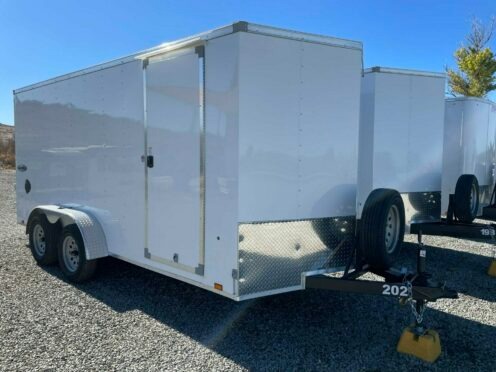Understanding Trailer Leases: A Complete Guide for Business Owners
Running a business that requires hauling equipment, materials, or goods means making smart decisions about transportation. One of the biggest choices you’ll face is whether to buy or lease trailers.
While purchasing might seem like the obvious choice, trailer leasing offers compelling advantages that many business owners overlook.
What Is a Trailer Lease?
A trailer lease agreement is a key statutory document specifying the terms and conditions of a trailer lease transaction between the owner and the lessee. Moreover, the lessor is the trailer’s owner, while the lessee is the individual or organization that intends to use the trailer.
Think of it like renting an apartment instead of buying a house. You get all the benefits of using the trailer without the long-term commitment and large upfront investment. The leasing company owns the trailer, handles maintenance, and you pay monthly payments for the right to use it for your business.
This arrangement works particularly well for businesses that need reliable transportation but want to preserve cash flow for other operations. Instead of tying up $30,000 to $100,000 in trailer purchases, you can access the same equipment for a fraction of the upfront cost.
Types of Trailer Leases
Full-Service Leasing covers everything from the trailer itself to maintenance, repairs, roadside assistance, and sometimes even licensing and permits. You pay one monthly fee and the leasing company handles the rest. This option works best for businesses that want predictable costs and minimal administrative headaches.
Net Leasing provides just the trailer, leaving maintenance, repairs, and other services to you. Monthly payments are lower, but you’re responsible for keeping the trailer in good condition. This option appeals to businesses with their own maintenance capabilities or those wanting more control over their equipment.
Short-Term Rentals bridge the gap between daily rentals and long-term leases. These arrangements typically last from a few weeks to several months, perfect for seasonal businesses or specific projects. For example, a business owner needs a special trailer to fulfill an order for one of his most steady clients. Buying the trailer would cost $3,000, while renting it for a week would only cost $700.
Financial Benefits of Leasing
Lower Upfront Costs represent the most immediate advantage of leasing. Leasing trailers often involves significantly lower upfront costs compared to purchasing outright. For businesses managing cash flow, this can be a game-changer. Instead of tying up capital in a trailer purchase, you can use that money for inventory, marketing, or other growth opportunities.
Predictable Monthly Expenses help with budgeting and cash flow management. Tax Advantages can significantly impact your bottom line. Lease payments are typically fully deductible as business expenses, while purchased trailers must be depreciated over several years. This immediate deduction can provide substantial tax savings, especially for profitable businesses.
Operational Advantages
Access to Newer Equipment ensures your business always uses reliable, efficient trailers. Newer trailers break down less frequently, meet current safety standards, and often provide better fuel efficiency when towing. This reliability translates to fewer delays, satisfied customers, and reduced emergency repair costs.
Maintenance and Support eliminate many headaches associated with trailer ownership. Full-service leases include routine maintenance, emergency repairs, and roadside assistance. When something breaks, you call the leasing company instead of scrambling to find a repair shop or keeping backup trailers available.
Flexibility for Growth allows businesses to adjust their fleet size based on changing needs. During busy seasons, you can lease additional trailers. When business slows, you can reduce your fleet without worrying about selling unused equipment. This scalability helps businesses respond quickly to market opportunities.
Understanding Lease Terms
Lease Duration typically ranges from 12 to 84 months, with most businesses choosing 24 to 60-month terms. Longer leases generally offer lower monthly payments but less flexibility. Consider your business’s stability and growth plans when selecting lease length.
Mileage Restrictions may apply to some lease agreements, particularly for specialized trailers. Exceeding these limits can result in additional fees, so accurately estimate your usage before signing. Many commercial trailer leases don’t include mileage restrictions, but always clarify this point.
End-of-Lease Options vary by agreement. Some leases allow you to purchase the trailer at a predetermined price, return it and lease a newer model, or simply walk away. Understanding these options helps you plan for the lease’s conclusion and avoid unwanted obligations.
Key Considerations Before Leasing
Assess Your Actual Needs by reviewing how often you use trailers, what types you need, and whether your requirements change seasonally. Businesses using trailers daily typically benefit more from leasing than those with occasional needs. Consider both current requirements and anticipated growth.
Compare Total Costs over the lease term, not just monthly payments. Include insurance, maintenance (if not covered), and any additional fees. While leasing might cost more over time than purchasing, factor in the value of preserved cash flow and reduced administrative burden.
Credit Requirements affect lease approval and terms. Leasing companies evaluate your business credit score, financial statements, and payment history. Strong credit typically results in better lease terms, lower deposits, and more favorable end-of-lease options.
Common Lease Agreement Components
Equipment Description should clearly identify the specific trailer being leased. Whether you’re managing one unit or an entire fleet, a precise description ensures both parties are aligned on the equipment involved.
Payment Terms outline monthly amounts, due dates, late fees, and acceptable payment methods. Some agreements offer seasonal payment structures for businesses with cyclical revenue patterns.
Insurance Requirements specify minimum coverage levels you must maintain. This typically includes liability, physical damage, and cargo insurance. The leasing company may require being named as an additional insured party.
Use Restrictions may limit how and where you can use the trailer. Some agreements prohibit certain types of cargo, specify geographic boundaries, or require approval for modifications.
Making the Right Decision
Trailer leasing makes the most sense for businesses that value cash flow flexibility, prefer predictable expenses, and want access to newer equipment without large capital investments. It’s particularly attractive for growing businesses that need to preserve working capital for expansion opportunities.
However, businesses planning to keep trailers for many years, those with excellent maintenance capabilities, or companies with significant cash reserves might find purchasing more economical long-term.
Consider your business’s financial position, growth plans, and operational requirements. Many successful companies use a combination of owned and leased equipment to optimize their transportation costs while maintaining operational flexibility.
The Bottom Line
Trailer leasing offers a practical alternative to purchasing, especially for businesses prioritizing cash flow and operational flexibility. While it may not be the cheapest option over extremely long periods, the benefits of preserved capital, predictable expenses, and reduced administrative burden make it an attractive choice for many businesses.
The point is to understand your specific needs, carefully reviewing lease terms, and choosing a reputable leasing partner. With the right lease agreement, you can access the transportation capacity your business needs while maintaining the financial flexibility to pursue other growth opportunities.
Whether you’re a startup looking to minimize initial investments or an established business seeking to optimize your transportation costs, trailer leasing deserves serious consideration in your equipment planning strategy.






